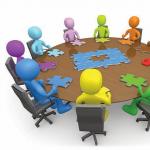Essay what a preschooler is like. Modern children and their development
Issues of child psychology, upbringing, and education are important at any time, in any society. Increasingly, we are faced with information about crimes against children, about the suicidal tendencies of teenagers, about the “decline of their morals” and interest only in the Internet. What are the reasons for all this? What are they like, modern children?
Issues of child psychology, upbringing, and education are important at any time, in any society. Increasingly, we are faced with information about crimes against children, about the suicidal tendencies of teenagers, about the “decline of their morals” and interest only in the Internet. What are the reasons for all this? What are modern children like?
This summer with a report on the topic "The nature and degree of changes in modern childhood and the problems of organizing education at a historically new level of development of society" spoke David Feldstein(Soviet, Russian teacher and psychologist, specialist in the field of developmental and educational psychology, developmental psychology, personality psychology; professor, academician and vice-president of the Russian Academy of Education). In the report, we did not find specific measures to change the situation in upbringing and education, however, it clearly outlines the “differences” between modern children and us, parents. Scientists are sounding the alarm about our indifference: “An unfavorable prognosis for further changes in the field of general mental development and personality formation of a growing person. Firstly, low level of development of parental motivation. Secondly, today adults have become indifferent to other people's children. Thirdly, and most importantly, it is obvious loss of adult responsibility for children".
So, 14 distinctive features of modern Childhood:
1. In a minimally short five-year period, starting from 2008, sharply decreased cognitive(cognitio - “cognition”) development of preschool children.
2. Children's energy levels have decreased, their desire to actively act.
3. Noted narrowing the level of development of role-playing play in preschoolers, which leads to underdevelopment of the child’s motivational-need sphere, as well as his will and arbitrariness.
4. A survey of the cognitive sphere of older preschoolers revealed extremely low indicators in those children’s actions that require internal retention of rules and operating in terms of images.
5. Underdevelopment of fine motor skills of the hand older preschoolers, lack of graphic skills.
6. Lack of social competence 25% of children of primary school age, their helplessness in relationships with peers, inability to resolve simple conflicts.
7. As data obtained over 15 years (from 1997 to 2012) show, significantly (almost 2 times) the number of children has increased 6, 7, 8, 9, 10 years with speech development disorders(from 40 to 60% varying in different regions).
8. Causes serious concern reluctance of a significant part of today's schoolchildren to study.
9. Activation at the teenage stage of ontogenesis (the process of development of the organism) of the communication process and the increased need to present oneself to the world are blocked by the lack of appropriate structures adequate to the needs and capabilities of a growing person.
10. Impoverishment and limitation of live, tactile communication of children, including teenage children, with peers, increase in the phenomena of loneliness, rejection, low level of communicative competence. (If in the early 90s many teenagers were distinguished by a feeling of loneliness, but at the same time their anxiety was in 4-5 places in terms of severity of manifestation, then in 2012 anxiety among 12-15 year olds came to 2nd place).
11. It's getting bigger children with emotional problems who are in a state of affective tension due to constant feelings of insecurity, lack of support in close surroundings and therefore helplessness.
12.In children
adolescence regressive changes occur in the brain support of cognitive activity, and the increased activity of subcortical structures caused by the hormonal process leads to deterioration of arbitrary regulation mechanisms.
13. Observations of the dynamics of the physical development of children have revealed a tendency towards a progressive decrease in the rate of their longitudinal growth, an increase in asthenia of the physique, a lag in the growth of muscle strength.
14. In the population of modern growing people, a large group consists of children, for whom characterized by an unfavorable, problematic course of mental development in ontogenesis.
Perhaps this information will help you raise caring, kind, successful, happy, harmonious... the very best children. It’s interesting that scientists are sure: “Today, boys are able to sympathize with other children only under the age of 8, girls up to 9-10 years old. And boys up to about 7 years old can rejoice, but girls practically do not know how to do this.” It's time to change something!
Reads: 14973
Consultation for teachers in preschool kindergarten
“Educational opportunities for modern preschoolers”
Savostina E.N., teacher of MBDOU D/S No. 21 “Fairy Tale”, Stary Oskol, Belgorod region
Today, the process of changing educational standards is actively underway, the methods and means of teaching children are changing. There is only one principle - modern education for modern children. And what about modern children? What are they like? More and more often you can hear that they are somehow different. Let's figure out what's wrong with them?
Here are some features of modern children:
- Modern children can be called digital natives - these are all those who were born and raised surrounded by computers, game consoles, mp3 players, video cameras, cell phones and other digital toys. From birth, our children are exposed to modern high-tech achievements. all technical innovations become part of the life of the younger generation. A child learns about the world through a monitor screen, and it is the computer that becomes a source of information for him, which young children absorb like sponges. They talk about “adult” topics, watch TV series, understand the intricacies of plot lines, remember well everything that happens to the heroes of passions and retell the episodes in detail to their grandmothers and mothers. Preschoolers sometimes make such unexpected conclusions and conclusions in non-childish situations that adults begin to seriously think about the premature maturation of modern children. In our opinion, this is “hearsay”, which, unfortunately or fortunately, there is no experience with. Teachers of preschool institutions “painted” a portrait of a modern child based on their own observations: developed, inquisitive, intelligent, erudite, liberated, brought up by television. Modern children's imagination and creative activity are sharply reduced. Children are focused on getting quick and ready results at the press of one button. Although modern preschoolers are technically savvy and can easily handle television, electronic and computer games, they build with construction sets in the same way as their peers of previous years, without being ahead of them in anything.
- If earlier a child had a well-developed imitative reflex, and he tried to repeat the actions of an adult, then in modern children the freedom reflex predominates - they themselves build a strategy for their behavior. If a child understands and accepts the meaning of an act or action that he must perform, then he will perform it. If not, he will refuse, expressing protest, even to the point of aggression. Children are persistent and demanding, have high self-esteem, do not tolerate violence, and do not hear the instructions and orders of adults. Their innate desire for self-realization and the manifestation of their active nature is noted. They have problems with emotionality; they lack it. Many people do not understand what is bad, painful, and very scary. These children are less romantic and more pragmatic. Their world is filled with material values.
- Modern preschooler child says a lot (if he speaks), but bad. Teachers are sounding the alarm. The lowest rates of implementation of training and education programs most often relate to the “Speech development” section. Not only the “Coherent Speech” section suffers, but also the “Dictionary” section.
- The health of the younger generation is also undergoing changes taking into account the environmental situation, and often physical health indicators leave much to be desired. The child may suffer physically and this aggravates the situation if he is in an unfavorable social environment.
- For a modern child, especially a resident of a big city, nature is an alien, unknown environment. The natural children's "yard" community has disappeared: children are now less likely to play freely and communicate with peers, the tendency to individualize play, and, as a result, social alienation of children is increasing. The reasons for this phenomenon lie not only in the change in the nature of the game, but also in those moments in the development of children's individuality, which we have already mentioned above.
So, as we see, the most vulnerable is the sphere of social and personal formation. But it is precisely in preschool age that the foundations of the personality of the future person are laid.
That is why the main task of educating preschoolers today is to preserve (and/or revival) conditions in which the child plays with peers, collaborates with other children in solving various cognitive tasks, shows cognitive initiative, satisfies his own curiosity, develops his own imagination and creative abilities. Where he experiments, fantasizes, discusses, learns to build relationships with people, empathize and find his place in the team, feels cared for and tries to care for others.
Today it is important to provide each child with attention and care for his mental and physical health, and for this, through the joint efforts of the kindergarten and family, it is important to form in children a sense of emotional well-being and psychological comfort, so that he can joyfully and fully live the most difficult and responsible period of his life. life - childhood. It is “here and now” that the foundations of the personality of the Man of the Future are laid. And if we adults don't realize this, we have nothing to look forward to in the future.
Let's think together. What and how will the younger generation learn in the 21st century?
Bibliography
- Poddyakov N.N. Mental development and self-development of preschool children. St. Petersburg : Educational Cooperation Agency. Educational projects. Speech; M.: Sfera, 2010. P.3.
- Ushinsky K.D. Man as a subject of education. T.1 St. Petersburg, 1881. P.461.
- Feldshtein D.I. Essential features of modern childhood and tasks of theoretical and methodological support of the educational process. M.: Publishing house Mosk. psychosocial institute; Voronezh: Publishing house NPO "MODEK", 2009. 16 p.
Essay on the topic: “Modern preschooler”
Boltrushevich Margarita Aleksandrovna
Teacher GBOU school 1302
To the question: “What is he like - a modern preschooler?” - it is impossible to answer unambiguously. A modern child is not the same as his peers were just a few years ago. Previously, children tried to imitate adults; they were more independent. Modern children are very persistent, demanding, have high self-esteem, and do not tolerate violence. They are interested not only in toys, they want to learn a lot about human life, the surrounding world, and nature. They enjoy studying encyclopedias based on their interests. Children are very informed and inquisitive. You can argue with them and discuss any topics that interest them.
Preschoolers have become more lively, noisy, and emotional. They remember poems and songs well. But, despite their liveliness, their physical development is quite weak; children do not really like to do physical education. Due to health problems, many have delayed speech development; most require the help of a speech therapist. Many have impaired sound pronunciation, a poor vocabulary, and children also do not know how to give a complete answer, compose a story based on a picture, some have difficulty retelling a fairy tale or story.
But, despite these difficulties, they can retell their favorite cartoon with pleasure and in detail or describe the characters of a computer game. They watch a lot of videos, sometimes without adult supervision. They prefer computer games to role-playing games. It is very difficult for their parents: everyone wants to have a good income and create excellent conditions for their child, so they sometimes forget about spending time with their child. Adults are very interested in early intellectual development, sometimes they forget about such a component as play; few parents play with their child, so he has no choice but to watch TV, play on his phone or tablet. The deficit of affection and parental attention is growing.
Communication between preschoolers comes down to discussing a new cartoon or a new toy. It’s bad that a child communicates with peers or adults only in kindergarten or on the playground. Favorite characters are those from children's animation (they are not always endowed with positive qualities). Watching independent heroes, you can see how the heroes of these cartoons (zombies, monsters, spidermen) become role models for preschoolers.
Now adults' priorities have changed. In society, intellectual education comes first, then persistence in achieving goals, and health comes third. Unfortunately, qualities such as morality, emotional and social values come in last place. This certainly affects the character and behavior of our children in a far from positive way.
Modern children do not know how to listen and hear another person, they do not know how to empathize, be patient, and wait. Unfortunately, sometimes unmotivated aggression appears towards peers, and sometimes towards adults.
Modern children are well acquainted with complex technical devices, sometimes better than adults. But they have difficulty mastering self-service skills. It’s becoming less and less common to hear the phrase: “I do it myself!” They don't want to grow up. Parents themselves limit children's independence, undress, dress, feed themselves. Children began to disdain work assignments.
The modern child is characterized by a variety of traits, they are ambiguous. But one thing is for sure: they are very interesting!
It is unlikely that anyone will want to dispute the fact that modern childhood is very different from ours as it was 30 years ago. Besides the fact that the trees were taller and the grass was greener, the world has fundamentally changed a lot during this time. Our experts, psychologists Anna Skavitina and Nina Shkileva, discuss how today’s preschoolers differ from us at their age and why it seems strange to us what they like.


Children of different generations are very different from each other. Our grandparents were surprised by the voice from the radio, mothers and fathers ran to the cinema instead of lessons, we traced with a pen in a newspaper TV program, and our children themselves choose what to watch and even record it on video themselves. Parents often feel that “it was better before,” and that children’s programs are much worse than those that were created 30 years ago. This is due not only to the eternal conflict between fathers and children, but also to the fact that our children are completely different from us at their age.
They have a different pace
A modern preschooler can receive as many impressions and experience as many events in a week as his parents received in several months in their childhood.
They live in this rhythm, it is much more difficult for them to wait. They can't loiter around, stare out the window for hours at falling snow and passing cars, and endure pauses in dialogue or long cutscenes.
Yes, in their favorite cartoons everything flashes and jumps, in fact, just like in their lives.
Their lives are more eventful and filled with information
The life of modern children is organized differently. As soon as we step outside, the city instantly falls on us, attacking all the analyzers. Pictures, texts, voices and music, people and transport - all this is a constant flow in which you need to navigate, and our children can do this, it is familiar to them. Therefore, the stories that interest them can be more complex and rich than our favorite cartoons.

They have different requirements
And both parents and school. It was 20 years ago that you might not be able to read and write at the age of 7; they taught you everything at school. Today's first-grader should know and be able to do a lot, and this is also why so many educational programs and cartoons have appeared. Yes, preschoolers can remember and master all this, they are interested in dinosaurs and the design of household appliances, and this will really come in handy for them very soon, almost now.
They communicate less with peers
In our childhood, it was common to run away into the yard for the whole day with a key around your neck. For modern children, parents choose not only entertainment, but also friends. And these, of course, are only useful events and “right” boys and girls.
Therefore, on the one hand, stories about conflicts, victories over monsters and ways out of difficult situations become interesting, since in reality this aspect of relationships decreases, and dealing with this part of life is very important for a child. On the other hand, children like stories about simple everyday situations that happen, for example, in kindergarten or on the playground.
Perhaps in reality this does not happen often enough to become understood and mastered.
They live in a world with changed values and norms
You can find stories about the separation of parents or about the adoption of children, about tolerance for differences. And for our children this can be as important as stories about friendship and justice from our childhood. At the same time, by the way, they can also be relevant.
It is important to remember that when we say that Soviet cartoons are not suitable for modern children, this does not mean that they cannot like them and do not need to watch them at all. The idea is to not shy away from new products for children that may not appeal to modern adults.
Karaseva Margarita
Features of a modern preschooler
At present, no one has any doubt that kids today are not like that what their peers were like a few decades ago. The reasons for this are changes in the surrounding world, both objective and social, in methods of education in the family, in the attitudes of parents, etc. All these social changes led to psychological changes. The number of children with poor health, hyperactive children, children with emotional and volitional disorders is rapidly increasing, many preschoolers have delayed speech and mental development.
What are the reasons for such changes? Firstly, the generation gap between parents and children. Increased involvement of parents at work is one of the features of raising modern children. Observations and surveys of parents have shown that most of them have little idea of what can and should be done with their child, what games their children play, what they think about, and how they perceive the world around them. At the same time, all parents believe that their children should be introduced to the achievements of technological progress as early as possible. Only a few parents know that scientists and numerous life facts have proven that the development of a small child, the formation of his inner world, occurs only in joint activities with adults. It is a close adult who enters into dialogue with the baby, it is with him that the child discovers and learns about the world, it is with the support and help of an adult that the baby begins to try himself in different types of activities and feel his interests and capabilities. And not a single technical means, not a single media capable replace a living person.
Next problem of a modern preschooler is growth"screen" dependencies. The computer and TV are increasingly, and in some families always, replacing reading fairy tales, conversations with parents, walking together and playing games. A survey of parents showed that their children spend several hours a day in front of screens, which far exceeds the amount of time they interact with adults. And, what’s most interesting, this suits many parents, especially dad. They don't often think about what it is "safe" the activity is fraught with various dangers not only for the physical health of children (impaired vision, lack of movement, poor posture, etc.), but also for their mental development. TV and computer games shape the soul and mind modern child, his tastes, views on the world, that is, they take away the educational function from the parents. But little children watch everything. As a result, a generation is growing up "screen" children.
The result of this is one of the main features of modern children – delay in speech development. Children speak little and poorly, their speech is poor. Scientists have found that over the past two decades the number of speech disorders has increased more than six times. But since speech is not only a means of communication, but also a means of thinking, imagination, awareness of one’s behavior, one’s experiences (the so-called internal speech), its absence leads to the child becoming unstable and dependent on external influences, with inner emptiness .
One more feature of modern children is a frequently observed failure to them to concentrate on any activity, lack of interest in the task, which is characterized by hyperactivity, increased absent-mindedness, etc.
It has also been noted that many children are now finding it difficult to perceive information by ear, that is, it is difficult for them to retain the previous phrase and connect individual sentences. As a result, such children are not interested in listening to even the best children's books because they are unable to understand the text as a whole.
Another important fact noted by preschool teachers is a decrease in curiosity and imagination among preschoolers, their imagination and creative activity. Such children do not invent new games, do not compose fairy tales, they are bored with drawing or constructing something. Usually they are not interested or attracted to anything. The consequence of this is a limitation of communication with peers, because they are not interested in communicating with each other.
The same contributes to what for modern children's children's "yard" a community where children could play and communicate freely with each other.
Observations of children show that some of them have insufficient development of fine motor skills and graphic skills, and this in turn indicates the underdevelopment of the corresponding brain structures.
Almost all teachers note an increase in anxiety and aggression in modern children. Observations show that aggression most often manifests itself when there is a lack of communication. In children, aggression often becomes a defense mechanism, which is explained by emotional instability. An aggressive child often feels rejected and unwanted. That's why he's looking for ways attracting attention, which are not always clear to parents and teachers, but for a given child this is the only known means. Aggressive children are very often suspicious and wary, they like to shift the blame for the quarrel they started onto others. Such children often cannot assess their own aggressiveness. They do not notice that they offend others. It seems to them that the whole world wants to offend them. And, besides, children cannot look at themselves from the outside and adequately evaluate their behavior.
I would like to talk about one more problem in education. modern preschooler. This modern toys. Many of them are not at all contribute development of gaming activities. But play is the leading activity of a child in preschool age. Now toys are aimed at the mechanical use of operations laid down by the manufacturer, and not promotes creative play.
Thus we see that in preschool age, although there are huge reserves for the development of a child and the formation of his personality, recently they have not always been used correctly. It is necessary to realize these reserves in specific forms of activity of the child, which best correspond to the needs and capabilities preschooler. These are different types of games, construction, visual arts, communication with adults and peers, etc.
That is why the main task of education modern preschoolers is to create conditions in which the child has the opportunity to play with peers, solve cognitive problems with them, satisfy his own curiosity, develop imagination, creative capabilities, build relationships with people, empathize, feel cared for and care for others. Today, more than ever, it is important to provide every child with attention and care for his mental and physical health, and for this, through joint efforts preschool institutions and families need to be formed from modern preschoolers a sense of emotional well-being and psychological comfort so that they can fully live the most important and responsible period of their lives - childhood, in which the foundations of a person’s personality are laid.
Informational resources:
1. Ashikov V. Once again about education // Preschool education. – 2005. - No. 4 – P. 3-5
2. Danilina T. A., Zedgenidze V. Ya., Stepina N. M. In the world of children's emotions: Benefit for practical workers of preschool educational institutions. - M.: Iris-press, 2004. -160 p.
3. Lyutova E. K., Monina G. B. Cheat sheet for adults: Psychocorrectional work with hyperactive, aggressive, anxious and autistic children. - M.: Genesis, 2000. -192 p.
4. Mukhina B.S. Age psychology: phenomenology of development, childhood, adolescence. - M.: Academy, 1999.-456 p.
5. Osipova A. A. General Psychocorrection. - M.: Sphere shopping center, 2002.-512 p.
6. Shirokova G. A., Zhadko E. G. Workshop for a child psychologist. - Rostov n/ D: "Phoenix", 2004. - 320 p.
7. Tugusheva G. P., Chistyakova A. E. Pedagogical conditions for the implementation of moral education preschoolers in activities // Preschool pedagogy. – 2007. - No. 8 – P. 9-11






